Malév Hungarian Airlines

Malév Hungarian Airlines

| |||||||
| Founded | 1946 (as Hungarian-Soviet Civil Air Transport Joint Stock Company) | ||||||
|---|---|---|---|---|---|---|---|
| Commenced operations | 25 November 1956 | ||||||
| Ceased operations | 3 February 2012 (2012-02-03) | ||||||
| Hubs | Budapest Liszt Ferenc International Airport | ||||||
| Frequent-flyer program | Duna Club | ||||||
| Alliance | Oneworld (2007–2012) | ||||||
| Company slogan | Wings to fly | ||||||
| Parent company | MNV | ||||||
| Headquarters | Budapest, Hungary | ||||||
| Key people | Lóránt Limburger (CEO) | ||||||
| Website | malev.com [65] | ||||||
MALÉV Ltd.[1] (Hungarian: Malév Zrt.), which did business as MALÉV Hungarian Airlines (Hungarian: Magyar Légiközlekedési Vállalat, abbreviated MALÉV, pronounced [ˈmɒleːv]), was the flag carrier of Hungary from 1946 until 2012. Its head office was in Budapest, with its main hub at Budapest Liszt Ferenc International Airport. The airline flew to over 50 cities in 34 countries with a fleet of 22 aircraft. Malév joined the Oneworld alliance on 29 March 2007.[2] On 3 February 2012, Malév ceased operations[3] and on 14 February 2012 was declared insolvent by the Metropolitan Court of Budapest.
| |||||||
| Founded | 1946 (as Hungarian-Soviet Civil Air Transport Joint Stock Company) | ||||||
|---|---|---|---|---|---|---|---|
| Commenced operations | 25 November 1956 | ||||||
| Ceased operations | 3 February 2012 (2012-02-03) | ||||||
| Hubs | Budapest Liszt Ferenc International Airport | ||||||
| Frequent-flyer program | Duna Club | ||||||
| Alliance | Oneworld (2007–2012) | ||||||
| Company slogan | Wings to fly | ||||||
| Parent company | MNV | ||||||
| Headquarters | Budapest, Hungary | ||||||
| Key people | Lóránt Limburger (CEO) | ||||||
| Website | malev.com [65] | ||||||
History
Beginnings
Hungarian civil aviation was pioneered by airlines such as Aero Rt. (founded 1910), Magyar Æeroforgalmi Rt. (Maefort) and Magyar Légiforgalmi Rt. (MALÉRT (mɒleːrt)). The widespread devastation of World War II forced these airlines to suspend airline service in 1940-44, and they were ultimately replaced by Maszovlet as the national airline after the war. Maszovlet was founded on 29 March 1946, as the Hungarian-Soviet Civil Air Transport Joint Stock Company (Magyar-Szovjet Polgári Légiforgalmi Rt. also known as MASZOVLET). A merge between Malert, Maefort and the Hungarian part of Aeroflot.
The initial fleet consisted of 21-seat Li-2 passenger aircraft (the Soviet-licensed DC-3) and 3-seat Po-2 "taxis", used for precision air mail: sacks of mail were dropped from the aircraft when flying over its destination. In 1950, Malév's operating base moved from Budaörs to the newly opened airport at Ferihegy, where it remained.
On 25 November 1954, Hungary acquired all the Soviet shares of MASZOVLET, and renamed the company to MALÉV. Ilyushin Il-14 twin piston-engined transport aircraft were acquired in the late 1950s. Operations were expanded, with flights extending to nearby countries and, following the 1965 acquisition of Ilyushin Il-18 turbine propellor airliners, and the subsequent 1968 purchase of jet-powered Tupolev Tu-134s from the Soviet Union, across Europe and the Middle East.
Even before the political changes of 1989 and the arrival of democracy, Malév had begun phasing out its Soviet-era planes with the introduction of the airline's first Western-designed aircraft, a Boeing 737-200 on 18 November 1988.[4][5] With that, Malév was the second airlines in the then-communist COMECON countries of Central Europe to operate a Western-built aircraft. (TAROM - Romanian Airlines started operating BAC 1-11 in 1968 and Boeing 707 in 1974. LOT - Polish Airlines was the third with its Boeing 767-300 aircraft launched in April 1989).[6]
The company's logo which turned out to be the last one, was designed by graphic designer László Zsótér (DLA) in 1986 and consecutively adopted during the following years.[7]
1990s-2007: Modernisation
The last Soviet-built Tupolev Tu-154 aircraft was withdrawn from service in 2001. In 2003, MALÉV began replacing its Boeing 737 Classic aircraft with 737 Next-Generation planes. It then ran a fleet of 18 Boeing 737 Next Generations, as well as 4 Bombardier Dash 8 Q-400s for short-haul routes.[8]
From 1999 to 2007, the Hungarian State Privatization Company ÁPV Plc. (Állami Privatizációs és Vagyonkezelő Rt.) owned 99.5% of Malév shares. The other 0.5% were in the hands of small shareholders. ÁPV Plc. repeatedly tried to privatise Malév, finally selling it to AirBridge Zrt.
2007-2011: In private hands
AirBridge acquired 99.9% of the airline in February 2007. It had 1,785 staff members, as of 31 December 2007.[9]
Despite Czech Airlines' offer to sponsor Malév as an associate member of the SkyTeam alliance, and MALÉV's codeshare agreements with several SkyTeam carriers, Malév joined Oneworld on 29 March 2007.
On 12 July 2007 Lloyd Paxton was appointed CEO of MALÉV. Paxton replaced János Gönci, who remained on the board of directors as an adviser. Mr Paxton had been with British Airways for over 35 years and more recently with Air Astana. Mr Paxton was the first MALÉV CEO to come from the airline industry. Two months later, on 14 September 2007, Lloyd Paxton resigned as CEO of MALÉV, replaced by Péter Leonov.[10] In January 2009, Ballo Anatoly Borisovich became the chairman.[11]
On 18 March 2009 the Russian state-owned Vneshekonombank took a minority stake of 49% in AirBridge Zrt which held the shares of the struggling airline. The majority, 51%, remained in Hungarian ownership. The managing control would be taken by Russia's Aeroflot - Russian Airlines. Martin Gauss, former CEO of DBA and Cirrus Airlines as well as a Boeing 737 pilot was elected as CEO on 15 April 2009.[12] During the management of Martin Gauss, MALÉV reached a load factor above industry average among "traditional" airlines, comparable of that of low-cost airlines. One of the reasons of the departure of Martin Gauss as CEO of MALÉV was the benefit ceiling established by the newly elected government, led by Orban Viktor, in 2010, where a ceiling of €8000 gross salary (approx €5000 net) was set for all managers, governing state owned companies.
The airline was renationalised in February 2010, with Hungarian Government state holding company MNV acquiring a 95 per cent stake in the airline. The remaining 5 per cent remained with AirBridge. In December 2010, the European Commission began an investigation into illegal government subsidies of Malév.[13]
2012: Financial collapse and cessation of operations
On 9 January 2012, the European Union considered the state aid received by MALÉV illegal and ordered Hungary to recover it from the company. The European Commission ordered MALÉV to repay various forms of state aid received from 2007 to 2010, totalling 38 billion forints (€130 m; $171 m), a sum equal to its entire 2010 revenue.[14][15] At the end of January 2012, MALÉV announced that it could no longer fund its own operations, and requested more subsidies from the Hungarian government.[16] After having two planes seized at foreign airports by creditors, MALÉV immediately ceased all flight activity on 3 February 2012, after 66 years of continuous operation. The airline's total debts were 60 billion forints (US$270.5 million) at the time of shutdown.[17] The shutdown occurred at 6 AM Western European Time on 3 February 2012.[18] On 14 February 2012, the Metropolitan Court of Budapest declared MALÉV Ltd. insolvent. Hitelintézeti Felszámoló Nonprofit Kft. (Credit Institutional Liquidator Nonprofit Ltd.) received the appointment as the liquidator of MALÉV Ltd.[19]
Corporate affairs
Before its closure, the airline had 2,600 employees and almost half of the air traffic at Budapest Ferenc Liszt International Airport.[14] In 2011 about 40% of the revenues at Budapest airport originated from Malév operations,[20][21] and during that year the airline served 3.2 million passengers.[22]
Head office
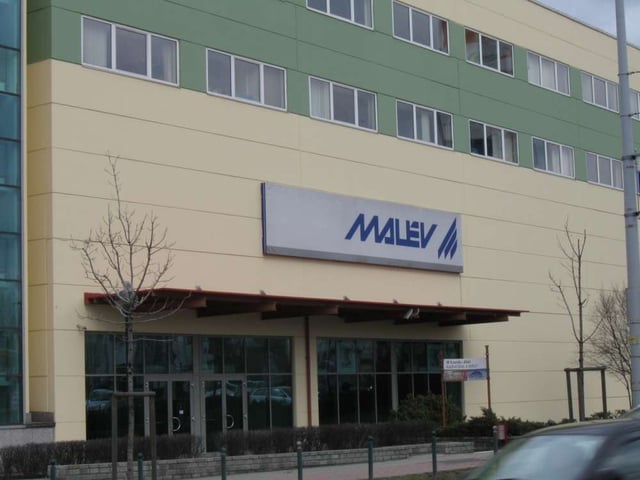
Malév's head office at Lurdy House
MALÉV's head office was located inside the Lurdy House (Lurdy Ház) in Budapest.,[23][24] an office and shopping complex that opened in 1998.[25] Previously the airline head office was located elsewhere in Budapest. In the 1960s and 1970s it was in V. Vörösmarty-tér 5,[26][27] and in the 1990s it was in Roosevelt tér 2.[28][29] The airline signed a lease agreement in the spring of 2011 with Budapest Ferenc Liszt International Airport agreeing to relocate its headquarters to three office buildings between Terminal 1 and Terminal 2 in the airport by the summer of 2012,[30] but these plans were cancelled due to the shutdown.[31]
Ownership
The airline was privatised in the 1990s.[32] In December 1993, ÁPV Plc. sold 40,316 "A" series shares to the airline's employees. In 1998 ÁPV Plc. held 64.089% of the company (4,929,954 shares), Alitalia-Linee Aeree Italiane held 30% (2,307,693 shares), Simest held 5% (384,615 shares), private entities held .333% (25,577 shares), and several local governments held the rest of the company. Local governments with stakes in Malév were Agárd, Balatonlelle, Budapest, Debrecen, Budapest District 5, and Budapest District 18.[33]
In 2007 the Russian brothers Alexander and Boris Abramovich acquired 49% of AirBridge Zrt as part of a privatisation program of the Hungarian government. After the AiRUnion alliance of the Abramovich brothers went bankrupt in 2009, Vnesheconombank took over the Abramovich stake.[34]
The government of Hungary re-nationalized the airline on 26 February 2010, after Malev experienced changes in ownership and financial difficulties. The government held 95% of the airline while AirBridge Zrt held 5%.[35] AirBridge Zrt was 51% owned by Kálmán Kiss and Magdolna Költő, two Hungarian individuals, and 49% owned by Boris Abramovich. Prior to 26 February 2010, AirBridge Zrt held 99.95% of Malév and minor shareholders held .05%.[36]
Destinations

Malev Hungarian destinations. Hungary Malev Hungarian Destinations
MALÉV Hungarian Airlines offered scheduled services to about fifty destinations in Europe and the Middle East; charter flights were also flown. Flights to Africa, East Asia, and North America had been terminated. Services on the Budapest-Toronto and Budapest-New York-JFK routes were suspended in mid-November, 2007.[37] Then, on 23 July 2008, MALÉV announced the cancellation of the New York and Toronto flights; these had been operated since the early 1990s.
Codeshare agreements
Malév Hungarian Airlines had codeshare agreements with the following airlines, beside Oneworld members:
|
|
|
Fleet
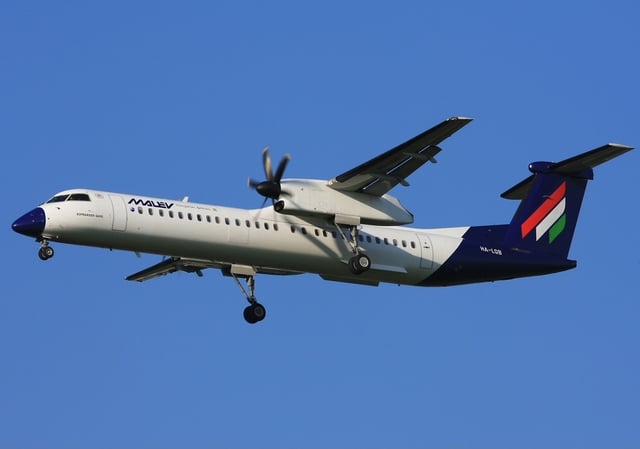
A Malév Bombardier Dash 8 Q400
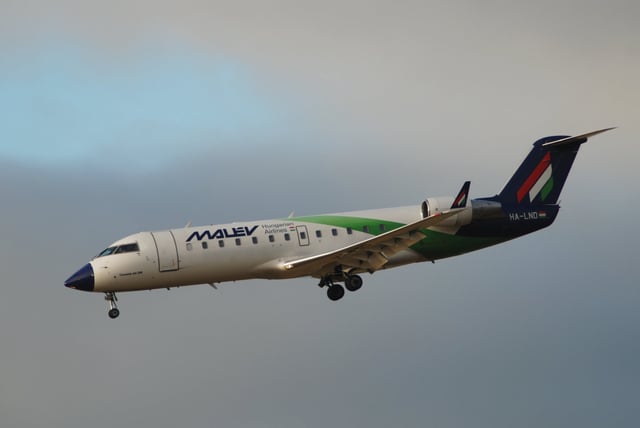
A Malév Bombardier CRJ200
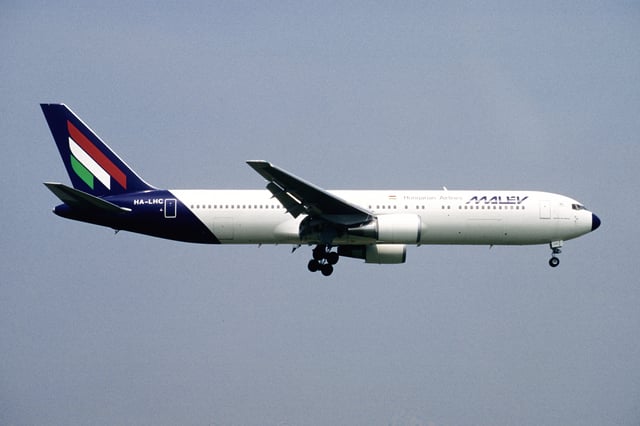
A Boeing 767-300ER

A Malév Boeing 737-700 landing at London Heathrow Airport, England. (2005)
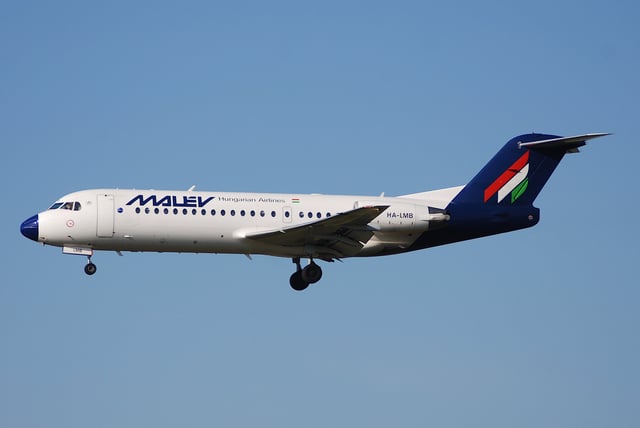
A Malév Fokker 70
Retired
Aeritalia G.222
BAe 146-200QT one used as a freighter
Bombardier CRJ100
Bombardier CRJ200
Boeing 737-300 replaced by Boeing 737-700
Boeing 737-400 replaced by Boeing 737-800
Boeing 737-500 replaced by Boeing 737-600
Fokker 70
Ilyushin Il-14 One restored as tribute to Malév and stored at Aeropark aircraft museum.
Ilyushin Il-18 Three on display at the Aeropark aircraft museum, one used as a restaurant in Abda, then moved to Košice for restoration in 2014[44]
Ilyushin Il-62 Leased from CSA Czechoslovak Airlines just for two months for few flights between Hungary and Japan.
Junkers Ju 52
Lisunov Li-2 One on display at the Aeropark aircraft museum, two more on display in Budaörs (one of them, HA-LIX is the only still airworthy plane of this type and can be booked for sightseeing flights)
Polikarpov Po-2
Tupolev Tu-134 One on display at the Aeropark aircraft museum, one on display in Szolnok, one on display in Auto & Technik Museum Sinsheim.
Tupolev Tu-154 One on display at the Aeropark aircraft museum
Yakovlev Yak-40 One on display at the Aeropark aircraft museum
Incidents and accidents
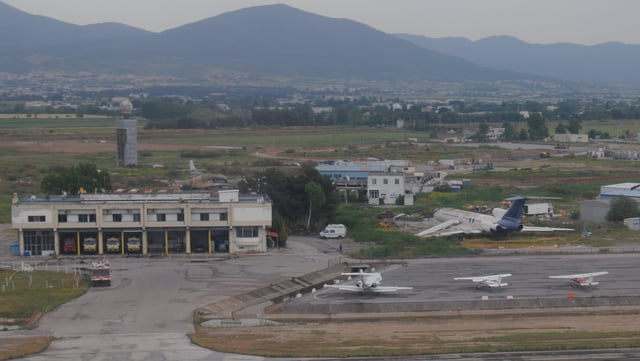
HA-LCR next to the airport fire station at Thessaloniki International Airport, in April 2018
- 23 December 1954A MALÉVLisunov Li-2P(HA-LIF) force-landed nearPolná, Czechoslovakia(now Czech Republic) due to icing; while landing, the left landing gear collapsed; all 33 on board survived (one person was injured), but the aircraft was written off.[45] On the same day another Malév Li-2P (HA-LII) belly-landed nearBratroňov, Czechoslovakia(now Czech Republic) due to icing; all 19 on board survived, but the aircraft was also written off.[46]13 July 1956MALÉVLisunov Li-2T(HA-LIG) was hijacked by seven people who demanded to be taken to West Germany; the aircraft landed safely at Ingolstadt Air Base with no casualties to the 20 passengers and crew on board.[47]13 October 1956MALÉVLisunov Li-2(HA-LID) was hijacked shortly after takeoff from Szombathely Airport by four armed men who wanted to be flown to the West; of the 19 on board, one died and two were injured.[48]6 August 1961MALÉVDouglas C-47A(HA-TSA) crashed in a residential area inBudapestwhile on a sightseeing flight due to crew negligence and loss of control, killing all 27 on board and another three on the ground.[49]23 November 1962MALÉV Airlines Flight 355, anIlyushin Il-18V (HA-MOD), crashed atLe Bourget Airport, probably as the result of a stall; all 21 on board died.[50]17 February 1964MALÉVVEB 14PHA-MAH was burnt out in a hangar fire atFerihegy Airport.[51]19 November 1969MALÉVTupolev Tu-134(HA-LBA), overran the runway on landing atAtatürk Airport, collapsing the landing gear and injuring the navigator (in the nose); there were no other casualties, but the aircraft was written off.[52]28 August 1971MALÉV Airlines Flight 731, anIlyushin Il-18V(HA-MOC), crashed into the sea on approach toCopenhagen Airport, killing 32; 2 survived.Dezső Szentgyörgyi, who was piloting the Il-18V at the time of the crash and also the top-scoring Hungarian ace of World War II, was among those who were killed.[53]16 September 1971MALÉV Airlines Flight 110, operated byTupolev Tu-134HA-LBD, crashed nearBoryspil International Airport,Kievin bad weather, following two missed approaches, after a generator failure caused the crew to switch to batteries; all 49 on board died.[54]15 January 1975MALÉV Flight 801 ooperated byIlyushin Il-18VHA-MOH, was being ferried fromEast BerlintoBudapestwhen it crashed on approach toFerihegy Airportdue to weather, poor visibility, poor CRM and possible spatial disorientation, killing the nine crew.30 September 1975MALÉVTupolev Tu-154aircraft on the Budapest toBeirutroute crashed near the Lebanese shoreline. SeeMalév Flight 240.21 September 1977MALÉV Airlines Flight 203, aTupolev Tu-134(HA-LBC), flying fromIstanbultoBudapestwith an intermediate stop atBuchareststruck level ground on approach, probably as a result of flying at reduced power, unnoticed by the crew. Of the 53 on board, 29 died.[55]29 March 1989Two teenagers fromCzechoslovakiaarmed with grenades and shotguns hijacked Flight 640 atPrague Ruzyně Airport, and flew theTupolev Tu-154Bwith 15 hostages toFrankfurt Airportbefore surrendering.[56]4 July 2000MALÉV Flight 262, a chartered MALÉVTu-154HA-LCR, landed on its belly atThessaloniki AirportinGreece. The crew had not successfully lowered thelanding gearand the aircraft skidded 400 metres (440 yards) on the runway. The aircraft was able to become airborne again as the pilots applied full throttle. It circled until the crew managed to lower the landing gear and landed safely. There were no injuries, but the aircraft was written off, and is now used for fire training.13 February 2009MALÉV Flight 440 from Budapest made an emergency landing at its destinationSkopje AirportinNorth Macedonia. At 16:05 the pilot reported right engine failure of theBombardier Dash 8 Q400whilst on final approach. The pilot safely landed the airplane and there were no injuries to the 64 passengers. The General Manager of Skopje Airport confirmed the incident.[57][58][59]25 June 2011MALÉV Airlines Flight 906, operated byBoeing 737-800HA-LOC, fromBudapesttoHeraklion International Airport, suffered atail strikeduring landing. None of the 180 passengers and 7 crew were hurt but the aircraft was seriously damaged. The incident was later attributed to pilot error.[60]
See also
List of airports in Hungary
Transport in Hungary